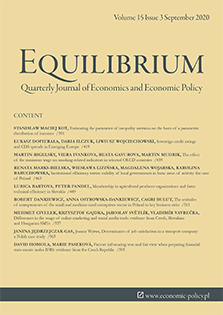The effect of the minimum wage on smoking-related indicators in selected OECD countries
The effect of the minimum wage on smoking-related indicators in selected OECD countries
Author(s): Martin Rigelský, Viera Ivanková, Beata Gavurova, Martin MudrikSubject(s): Labor relations, Government/Political systems, Substance abuse and addiction, Health and medicine and law, Demography and human biology, Economic development
Published by: Instytut Badań Gospodarczych
Keywords: smoking addiction; smokers; minimum wage; economic development; OECD countries;
Summary/Abstract: Research background: The amount of the minimum wage is, in some sense, an indicator of the economic level of a country. There are considerable differences in this indicator between the countries of the Organisation for Economic Co-operation and Development (OECD). At the same time, the minimum wage is also an instrument that largely regulates people's behaviour and affects different areas of life. Purpose of the article: The objective of this study is to determine the relations between the minimum wage and individual smoking-related indicators in a sample of selected OECD countries (16 countries). The study answers the question of whether people in countries with lower minimum wages (lower development) smoke more than in countries with higher minimum wages. Methods: Four variables entered into the analytical processing, the minimum wage, daily smokers (age 15+), daily smokers (age 15–24) and tobacco consumption in grams per capita (age 15+). The data were collected between 2011 and 2017. The analysis was carried out in three steps — descriptive analysis, cluster analysis and regression analysis. Findings & Value added: It has been found that the minimum wage negatively affects smoking and tobacco consumption, i.e. in developed countries, where the minimum wage is higher, people smoke less. Regarding the evaluation of minimum wage and tobacco consumption, countries such as Austria, New Zealand or the United States can be considered positive. On the other hand, opportunities for improvement can be seen in countries such as the Czech Republic, Spain, Estonia and Israel. The study highlights the importance of the effect of the minimum wage on selected smoking-related indicators in selected OECD countries. In all three cases, there was a negative relation; therefore, smoking can be expected to decrease, if the minimum wage is increased.
Journal: Equilibrium. Quarterly Journal of Economics and Economic Policy
- Issue Year: 15/2020
- Issue No: 3
- Page Range: 439-461
- Page Count: 23
- Language: English

